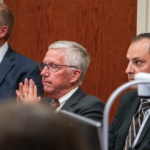
Agency follows long held Massachusetts tradition of withholding hiring and firing details
At recent meetings of the Massachusetts Cannabis Control Commission, the search for a new executive director has prominently featured on the body’s stacked agenda. Since the departure of former ED Shawn Collins last November amidst clear agency chaos, commissioners have been deliberate in fostering transparency around replacing him, setting timelines and preparing for a very public vetting process. There are three meetings of the candidate-screening subcommittees scheduled for this week alone.
But the CCC is not so open about all of its personnel decisions. The commission has been marred by vacancies and the departures of key staffers, from the investigations to legal departments. And while cheery farewells to outgoing workers and warm welcomes to new ones are common at meetings, it’s less common for the agency to divulge pertinent specifics around resignations, hires, and fires. This week, for example, acting Chair Ava Callender Concepcion told colleagues in an email that she is taking a leave of medical absence, but the commission did not make the announcement publicly.
And now, since secrecy tends to breed inquiry, some of the comings and goings around the agency are becoming much bigger news, with the Boston Globe reporting over the weekend that the CCC’s “directors of licensing and testing have left their jobs” in “the latest personnel shakeup at a state agency that has been beset by leadership changes and a call from the state inspector general for a receiver to handle its daily operations.”
Recognizing work by blogger Grant Smith Ellis to pry these plotlines from agency sources, the Globe reported, “An inquiry sent Saturday to Licensing Director Kyle Potvin’s email address at the commission triggered an automated response that said he no longer worked for the agency and directed requests to other employees. The same thing happened when an inquiry was sent to James Kocis, director of testing, on Saturday.”
There has recently been turbulence in both of those departments; on the licensing side, the CCC discovered and disclosed that it failed to collect more than half-a-million dollars in fees, while the testing department has been criticized for its (lack of) enforcement targeting lab fraud. But it’s unclear if these two latest departures are related to those issues; reached for comment, an agency spokesperson told the Globe what they tell everyone who pokes around on personnel matters: they don’t comment on them.
This being Massachusetts, the CCC is well within its rights to keep us in the dark about HR developments—whether with these latest shakeups, or the neverending saga concerning suspended CCC Chair Shannon O’Brien and details around that fiasco. Per Wakefield Teachers Association vs. School Committee of Wakefield, the precedent tracks back to “Sometime before March, 1995,” when the superintendent at Wakefield Junior High School learned that a male teacher “had written potentially inappropriate notes on the homework assignments of two female students in his class.” “The superintendent conducted an investigation into the allegations, including an interview with the teacher and two union representatives, and wrote a report.”
Needless to say, journalists and people in that community wanted to see that report. But to their dismay, the court ruled “the report, which resulted in the teacher’s four-week suspension, constitutes part of the teacher’s personnel … file … or information,’ and is exempt from disclosure.”
That decision also cites Globe Newspaper Co. vs. Boston Retirement Board, a 1983 case in “which the court examined how disclosure of certain personnel info ‘may constitute an unwarranted invasion of personal privacy.’” The conclusion of that one created two categories of records exempt from public disclosure: “personnel and medical files or information,” and “other materials or data relating to a specifically named individual, the disclosure of which may constitute an unwarranted invasion of personal privacy.”
All things considered, cannabis industry stakeholders—like so many others in the Bay State—often find themselves in a position of knowing much less about a public institution that their livelihoods depend on than they’d like to know.
At the same time, the CCC HR department may be in better shape than its harshest critics, like the state inspector general, have suggested. While IG Jeffrey Shapiro included in his comprehensive testimony on Beacon Hill last month that “Currently the Commission has over twenty vacancies,” at last Thursday’s meeting, acting Executive Director Hilton-Creek said that all of those positions have been filled: “We have zero vacancies at this point. … We don’t have any open positions posted right now.”

Hilton-Creek, whose permanent position at the CCC is chief people officer, addressed the scrutiny directly: “A couple months back, there were some questions regarding postings of positions within the agency and concerns around the number of open positions. … The work that goes into recruitment is complex, and a lot of the time, when we are posting or replacing positions, it is dependent on a lot of variables.”
The acting ED and CPO said that time is a serious factor, and that the vacancies can lead to a backlog in other areas. “It’s not as easy and fast as people not working in the human resources field may understand,” Hilton-Creek added.
According to materials shared at Thursday’s meeting, the CCC currently has 15 acceptances and offers pending with people to fill spots across the agency, from a project coordinator to serve under the press secretary to attorneys in various roles. Hilton-Creek said it’s worth the extra effort, because if they don’t hire the right people with the right credentials, “we end up going through this vicious cycle.”
“I don’t recruit for warm bodies,” she said. “I recruit for talent. It’s worth it to take the time.”
























